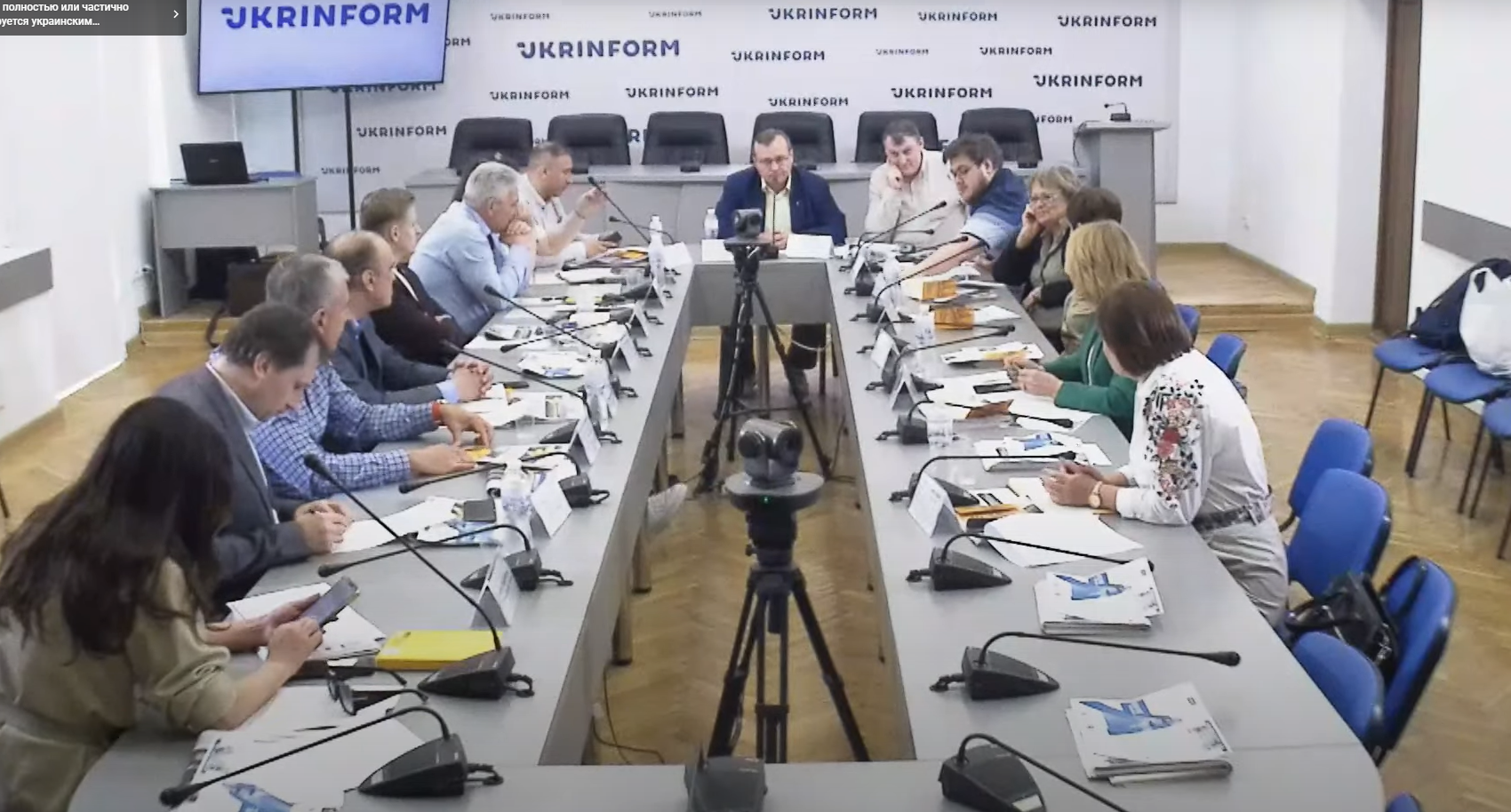Education in the de-occupied Crimea: the fight for children’s brains awaits us
On Tuesday, May 23, a round table, “Deoccupation and reintegration of Crimea: challenges in the field of education,” was held in Ukrinform, one of the organisers of which was the Holodomor Museum.
Andrii Ivanets, a leading researcher of our museum, moderated the event. He emphasized that the long-awaited moment of the liberation of Crimea and its de-occupation implies a number of problems and challenges awaiting Ukraine in the field of education. Therefore, now we need to prepare to overcome them as quickly and successfully as possible.
Ihor Solovei, head of the Center for Strategic Communications and Information Security, emphasized that in the de-occupied Crimea, “a great struggle for people’s brains awaits us.”
“We have all seen firsthand the importance Russia attaches to the education system within the country. After all, it is education that grinds and assimilates the peoples of the Russian Federation into one “Russian nation,” Ihor Solovei says. — Therefore, it is not surprising that one of the first steps in the territories occupied by Russia in Ukraine is the creation of educational and informational ghettos with the subsequent inclusion of the educational and informational system in Russian realities. We saw this in the Kherson, Kharkiv, and Zaporizhzhia regions. And this has been happening for a long time in the previously occupied territories of Donbas and Crimea. And I believe that the war will not end with the military deoccupation of Crimea. Because it will be necessary to deal with the de-occupation of the brains of Crimeans, first of all children. And the weight and importance of education in this process is difficult to overestimate.”
Valentyna Potapova, the head of national advocacy in the field of education at the Centre for Civic Enlightenment “Almenda,” announced impressive figures in this context.
“According to the latest data from the Russian Federation, only 34 children in the entire Crimea have access to their native language among children of preschool age. Only 197 children out of 230,000 study in schools in their native language (Ukrainian. – Ed.). The history of Ukraine has not been studied in schools for nine years. The history of Ukraine is not available either in libraries or in Ukrainian cultural centres. In the textbooks on world history implemented according to Russian standards, the history of Ukraine does not exist at all, and in the history of Russia, Ukraine has no subjectivity – our state is shown as part of the Russian empire. Therefore, children do not understand at all that there is a state of Ukraine, a Ukrainian people,” Valentyna Potapova emphasised.
She adds that there is a system of destroying Ukrainian identity for children in Crimea. At the same time, active militarization of the sphere of education and upbringing continues.
“The goal is to turn children into Russians. Concepts implemented since 2014 are aimed at this, and everything has intensified since 2022 with the implementation of the law on patriotic education. The mechanisms are lessons such as “conversations about what is important” aimed at distorting history, as well as military-patriotic camps, cadet classes, more than 874 units of the youth army, whose members are more than 30,000 children. There are already more youth army units on the peninsula than there are schools,” the expert added.
Personnel potential is another issue. Thirty thousand educators provided the educational process on the peninsula. During the nine years of war, Ukrainian teachers were replaced by “proper Russian” ones brought from mainland Russia under the “Zemsky teacher” program, or those ready to cooperate with the occupiers were retrained.
Who replaces this army of educators is also a big question.
“The main problem of the personnel reserve is that it does not exist today. At the same time, it will also be needed for the de-occupied territories of Donbas, as well as Zaporizhzhia and Kherson regions,” Yurii Smeliansky, co-founder of the Institute of Black Sea Strategic Studies, says.
Obviously, many of the Crimean teachers should go through lustration, and some should be held responsible for collaborationism.
Andrii Shchekun, coordinator of the Humanitarian Policy Group of the Crimean platform expert network; Serhii Syrotenko, deputy head of the Secretariat of the Commissioner for the Protection of the State Language; Vladyslav Miroshnychenko, an analyst of the Ukrainian Helsinki Union of Human Rights, head of the department for de-occupation and reintegration of the Autonomous Republic of Crimea of the Presidential Representation took part in the discussion. In ARC Stepan Zolotar, director of the Ukrainian School-Gymnasium of Simferopol (1997-2014) Natalia Rudenko, deputy representative of the president in 2006-2007 Oleksandr Levchenko, head of the Department of Ukrainian Philology of Sevastopol Humanitarian University (1994-2014 ) Olena Popova, history teacher of secondary school No. 15 in Yevpatoria (1996-2014) Olha Slobodaniuk, dean of the Faculty of Humanities and Social Sciences of the Eastern Ukrainian National University named after Volodymyr Dal Svitlana Kuzmina, co-coordinator of the “Space of Freedom” movement Taras Shamaida, representative of the Notary Chamber of Ukraine Olena Pavlovska.
Based on the results of the “round” table, they prepared a resolution with specific proposals, which will be submitted to the relevant authorities for consideration.
